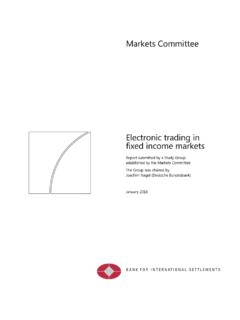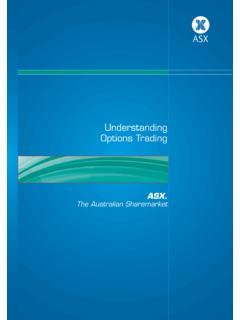Transcription of Is your client a property developer? - Pitcher Partners
1 Is your client a property developer ?Disclaimer // The material and opinions in this paper are those of the author and should not be taken as specific advice for any person or entity. The material and opinions in this paper should not be used or treated as professional advice and readers should rely on their own enquiries or seek professional advice specific to their circumstances in making any decisions concerning their own interests. Copyright Scott McGill, Pitcher Partners Introduction and overview What are the issues to be aware of? 12. Assumed knowledge Tax treatment of property realisations What happens when you lose money?
2 Some givens that need to be considered Most property investments will be on capital account (or at least start that way) Things can change You will need to think about GST Care with securing CGT status and concessions 33. Comments It s my home, I won t pay tax on that, will I? Goods and Services Tax 64. Practical examples Sell now for between $ and $ Sell 600m2 off the back yard and keep the house Mum and Dad decide to do it Mum and Dad decide to syndicate with surrounding properties to realise best value 95. Revisit the lay of the land in the revenue v capital distinction The basics and history 106.
3 The distinction between revenue and capital The ATO view TR 92/3 and TD 92/161 TR 92/4 income tax: whether losses on isolated transactions are deductible Does enterprise matter? The view of the Courts The established position More recent cases The negative gearing conundrum and s51 AAA income Tax implications where the sale of property is on revenue account Land as trading stock Land on revenue account not trading stock income tax implications where the sale of land is on capital account Timing of sale transaction under CGT event A1 where sale is on capital account Optimising the interaction of CGT and revenue treatment Quick summary Investors vs Developers property developers property investors
4 327. Specific GST issues The GST basics What property is subject to GST? Get your contract right! GST registration requirements Beware Adjustment events DIVISION 129 Where your application of the thing ends up being different DIVISION 135 Adjustment after acquisition of a GST-free going concern DIVISION 138 Adjustments on cessation of registration ATO query / review / audit Retention payments 38 About Pitcher Partners 40 Firm locations 4121. Introduction and overviewProperty remains a target for consideration with the ATO, and there is increasing engagement of people from all walks of life in property plays that often involve some level of improvement, if not complete the real estate markets in Sydney and Melbourne experiencing sustained growth in residential property values, almost every owner has experienced the upswing in value, and many are considering how they might now realise this value.
5 Some may simply look to downsize and cash up for retirement, while others may look to subdivide portions of large blocks, perhaps redevelop or build a duplex: selling one and keeping the since the introduction of Capital Gains Tax in 1985, industry and advisors seemed comfortable that the old revenue cases were easy to understand, with the CGT regime dealing with the rest; punishing those who sold within 12 months with no continuing boom in property in Australia has resulted in both more focussed efforts to maximise value on any property investment, and existing property owners putting properties into ventures to develop , homeowners are being approached by developers either individually (or in a line with neighbours) to realise prices that many would not have anticipated.
6 As a response to this, neighbours are starting to work together in key areas to realise the best value for themselves, either by obtaining the development approval (DA) and selling as a package, or even undertaking the development themselves perhaps partnering with a rewards are potentially large, but with all rewards comes risk. Those considering such an undertaking should tread carefully to avoid those risks, as well as a potential What are the issues to be aware of?The most common question raised is how much tax will we pay? Usually followed by it s my home and that s exempt from tax isn t it?
7 Questions about GST, and whether or not a company or trust should be utilised are usually follow-up is beyond the scope of this article to address the due diligence required in getting your building contract and pricing right, or testing your expected gross realisations on sale. We strongly recommend that you do your homework and do engage with experienced professionals to assist. From experience, cost savings here usually lead to difficulties later that well outweigh the costs. If you need help or introductions, please contact we can directly assist on are the key issues of structure and taxation.
8 Taxation costs across income tax, GST, Duty and Land Tax can be significant if not managed properly. Similarly, your structure and the basis on which you may enter arrangements with other parties can severely impact your commercial exposure and put your valuable property at risk. This paper focusses on the income tax, CGT and GST Assumed knowledgeI have included detailed comments that I have drawn from my previous papers and presentations that focus on the technical issues. Below I focus on the more practical issues using a series of examples. We can delve into the technical issues as required I am always happy to have a robust discussion on these Tax treatment of property realisationsUnderstanding of the Revenue v Capital distinction see Chapter 6 generally - and the three main ways that the sale or realisation of property may be treated: On capital account where the sale will be treated as a capital gain as opposed to ordinary income .
9 Assets held longer that 12 months will be eligible for the Capital Gains Tax (CGT) discount for eligible trusts and individuals. On revenue account but not trading stock. To be trading stock, you must be in business - this will arise where the property is not part of your business or indeed the core of a business in itself, yet: The intention or purpose of the taxpayer in entering into the transaction was to make a profit or gain; and The transaction was entered into and the profit was made in the carrying out of a business operation or commercial comments below in regard to TR 92/3, TD 92/161 and Myer Emporium under Section is assessed on completion, sometimes with complex calculations to isolate the part that may be capital proceeds, which is of course assessable in the year that the contract was exchanged.
10 Trading stock as part of your business. Normal trading stock valuation options apply and ultimately proceeds are assessable in the period What happens when you lose money?For a loss on capital account, this simply creates a capital loss which can only be used to offset current period capital gains or future period capital you have a revenue asset that is not part of a business or trading stock, losses made can be set off-set against other assessable income for revenue purposes. This is in accordance with TR 92/4. However, in practice you might find this more difficult and cases such as Hartley in regard to speculative shares demonstrate why.







